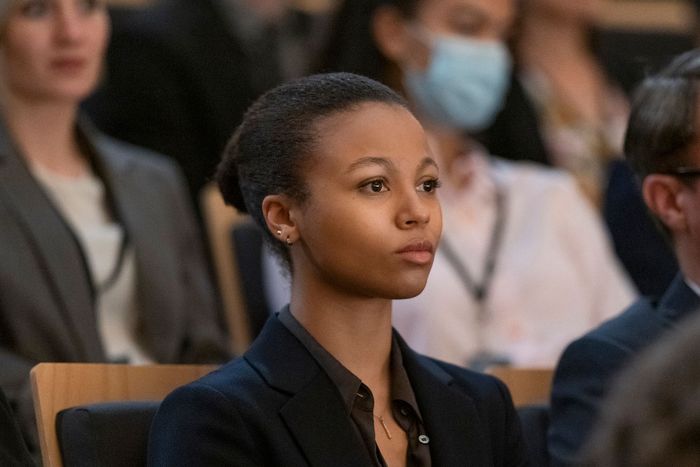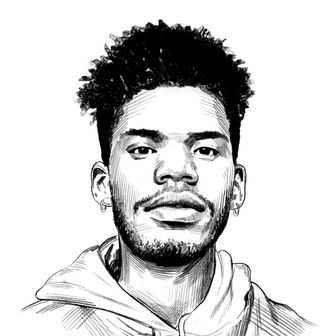
Industry is a drama set in a London bank. I watched the first season and was very confused about what made it work for some audiences while completely repelling others. Initially, as one of the repelled, I threw up my hands at the show. But having watched it again, I’m starting to really understa — nope, still baffled. We gathered Shamira Ibrahim, culture writer and critic, Nic Juarez, our recaps editor, and Nick Quah, our podcast critic, to talk it out.
I wanna start with Shamira, since you have experience in this financial shit. I don’t know what to even call that … economics? Why the fuck do you watch this show?
Shamira Ibrahim: I’ve had a series of jobs where my friends have no idea how to explain what my job is. That world is very familiar to me in a way that is pretty embarrassing. There’s certain things about the experience that are very relatable when you’re just outta school and you’re like, Oh my God, all these oppressive people around you, and you realize that they’re all very masochistic and sadistic people who actually have nothing else going on for themselves beyond the value that they offer to their workplace. Because of that, that’s how they have to maintain this hierarchical level of abuse. So much of that show is real dynamics but played to absurd levels. Are people really walking around with bats? Not in 2022. But is there a level of bullpen-type energy and dog-eat-dog space where you live and die by what your manager says and will make or break your career? Abso-fucking-lutely.
So I was first just curious about the idea of that. And the second thing was, I was like, Oh, they’re doing this around a Black American woman in London. And they’re letting her be an anti-hero, ’cause she’s not a good person.
Nic, are you watching it for the weird dom play? How are we taking that in?
Nic Juarez: I used to work in marketing tech, where the energy’s really similar. And I remember putting in long hours and feeling like my manager, who, in retrospect, was a psychopath — their mood really affected whether I was gonna have a good day or not. Watching that in a different setting is really cathartic and triggering. Even though the story lines are bonkers, bananas, the cast is really charming. Ken Leung, who plays Eric, is just so good. One moment, like, “I’ve got your back” and the next second he’s, you know, locking the room, closing the blinds. You’re like, Hey, what? You know, What the fuck?
Quah, why are you here for the ride?
Nicholas Quah: I follow financial news close enough to have a broad sense of what’s happening with the actual mechanics. So, for example, the last scene in the last episode was kinda like watching a sports movie in a pivotal scene, but if you don’t actually know what the sport is. I feel like a dog staring at it. I’m drawn to the pure nihilism of this show. We’re looking at a very diverse cast of craven egomaniacal assholes who are probably actively doing very horrible things and making horrible people even richer. It’s fascinating to watch other people’s responses to how to grapple with Harper’s character in particular. It’s great to see a Black anti-hero; at the same time she’s working within this system that is so punishingly horrible. I do not feel good watching this, but I feel great feeling bad. I love that feeling way more than any other feel-good show.
That’s a fucking new one.
SI: That’s such a good way to put it. She plays such a high-wire dance, because so much of her terrible decision-making is based on her desperation to keep control. If you’re working on technology deployment, or if you’re in the middle of a big project, and everything is going to shit — like, it’s impossible for you to be in control. It’s absolutely impossible. So she’s making all of these terrible choices.
She’s just overwhelmed.
SI: And she’s just misfiring everywhere. She doesn’t wanna let the mask up. Because she doesn’t want everyone to know that she’s an impostor. Watch: The actress who plays Harper is so good at playing those nervous tics.
We see Robert this season getting an education from Nicole, because he was like, “I don’t know what the fuck I do in my job.” And she’s great: “I’m gonna manipulate you for the next couple of months, and we’ll figure it out.” These people talk, but they’re not saying much of anything. Also interesting to me is the response to that kind of exclusive language. It’s actually the perfect show to let wash over you. But, Nic, you said that you actually like the characters. What are you seeing that we’re not seeing, cuz honestly they seem fucking terrible.
NJ: You have to accept that they’re in a place where there’s no morality, there’s no ethics. What are you gonna do to survive? Robert, Yasmin, and Harper — they have their own version of impostor syndrome. With Harper, quite literally, it’s university elitism. For Robert, it’s his working-class background. For Yasmin, it’s her privilege; she’s a nepo baby.
SI: I’m obsessed with Yasmin.
I fuck with her story so much.
SI: Like the world’s tiniest violin that she insists on playing. I’m obsessed with the fact that she knows she’s always going to belong, even though she’s clearly the least talented person in every single room. I mean, beautiful gowns, stunning. But can’t be great at any of her sexual conquests — the girls and guys.
A linguist! A linguist babe!
SI: Love that for her. So, by default, she’s always going to belong in those circles in a way that Harper will not, and she seems to not be able to process why that’s always going to be a point of tension between them. She resents Harper and doesn’t get why Harper has frustrations. All these people will not be able to touch the hem of your garment ever in their lives. So the small bit of power they have, they use against you, and you like to sit and boo-hoo in one of your 75 houses.
Like, what are the big problems that you actually have? Did y’all feel bad for Lauren, who’s super-young, when Yasmin ate her up for nothing?
SI: It is such a bad thing to say, but it is such a common thing in corporate environments for women to not wanna be managed by other women — especially white or white-adjacent, whatever Yasmin considers herself.
NQ: She codes white, but —
SI: She’s Persian. Like, white-adjacent, a spicy white.
NQ: All of these people exist in hell, essentially. And they’re trying to elevate themselves within it. They’re trying to find selfhood and meaning in a place that inherently will not give you that unless you’re forged by its logic. Eric is so fascinating. I feel like I know a lot of Asian finance bros who are exactly like him. And I wonder, Why are you still here? You could do anything else. He’s one of my favorite characters I’ve seen on television, because he’s so sad.
No matter how much they fucking complain, no matter how much they cry in the bathroom, they wanna attain something that feels like comfort, success, luxury. One thing that we haven’t talked about yet is the elephant in the bedroom. There’s a lot of fucking, a lot of drugs.
SI: Just these very dramatic renderings of sex and, I wanna say, indulgence as an extension of their persona. How they use hedonism as an outlet for who they are as people. Yasmin never feels like she has control in real life. So in her sex life, she is a super-emasculating top who wants to be the person who dominates everything.
NQ: The show itself, for a lot of people who are drawn to it, is a fetish object. People watch it cuz they want that proximity. People still wonder what it’s like to be superrich or to be part of this world. I know a lot of friends of mine, on the one side of their face would say, “Oh yeah, you know, ‘Eat the rich, blah, blah, blah.’” And the other side of their face is that they’re watching the show and they secretly think that they could sell a book for millions and millions of dollars and move into this world.
SI: So much of it is just making rich people feel good and feel happy. Like, Mark Zuckerberg will call and be like, “I wanna buy half of Hawaii.”
NJ: Can we talk about Jesse Bloom, Jay Duplass’s character? I love Jay Duplass in general. When he shows up, particularly on a TV show, I hold my breath. The man is chaos. Purely a menace. He’s gonna ruin someone’s life. And I love that.
SI: I love what his story line is suggesting. Which is that they’re doubling down on the awfulness, right? This is a world where COVID does not matter to them. All that matters is: How could we maximize our returns from COVID? What big health deal can we get out of this? What returns can we get that will actually just hurt poor people but will make us trillions of dollars?
Let’s wrap on Harper. They’re starting to press her Blackness more this season. She has these models of who she could become all around her.
NJ: For Harper, the first season was all about: How are you gonna survive? And the second season’s like: How do you wanna live? What are you gonna be about? Like, I could go get a big-ass client. Ooh, watch this. Let me go get one.
NQ: I think that’s absolutely right.
NJ: They set the stakes at the beginning: “Hey, your worth here is how much you could bring in.” I think she thinks she’s trailblazing, but she’s being basic.
SI: When they were like, “Oh, the numbers are down in London,” and she was like, “Whose numbers, though, let’s be clear.”
She said, “Well, my numbers personally are doing great. How are your numbers, Eric?” Yo, I died.
SI: What rising tide are we lifting?
NQ: The show commits to nihilism. She is on a Breaking Bad arc. She very much wants power, but when she steps right up to it, it just seems she is not ready to have it. This person wants the sun, but she’s still gonna get incinerated.


